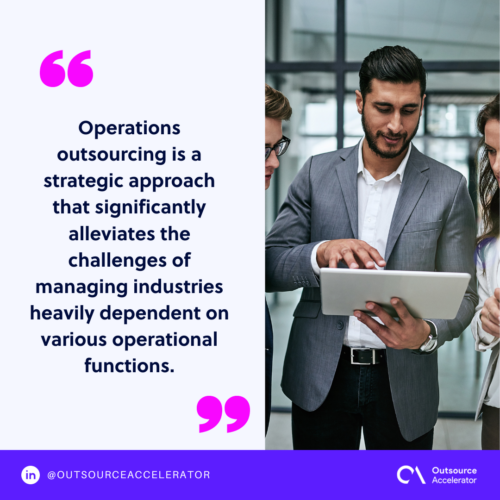Operations outsourcing: Areas, challenges, and tips

Managing an industry with a primary focus on operations can be challenging due to various factors.
Operations encompass the core processes that keep a business running, including production, supply chain, logistics, and customer service. The difficulty lies in coordinating and optimizing these diverse functions to ensure efficiency, quality, and cost-effectiveness.
Additionally, there’s a constant need to adapt to changing market conditions, regulatory requirements, and technological advancements.
Operations outsourcing is crucial in addressing these challenges by allowing companies to delegate non-core functions to specialized service providers.
When done right, operations outsourcing can enhance the overall management of the industry.
In this article, we’ll explore the intricacies of outsourcing your operational tasks, which areas are typically outsourced, the challenges, and some tips on how to do it right for your business.
What is operations outsourcing?
Operations outsourcing is a strategic approach that significantly alleviates the challenges of managing industries heavily dependent on various operational functions.

The difficulties of coordinating and optimizing core processes, such as production, supply chain, logistics, and customer service, often make industry management complex. These challenges may arise from changing market conditions.
As such, operations outsourcing offers a solution by allowing companies to entrust non-core items to specialized service providers. This helps firms not to be too reliant on in-house resources, grants access to external expertise, and facilitates scalability.
Popular areas for operations outsourcing
When it comes to operations outsourcing, the following key areas are commonly targeted:
IT and technology support
Operations outsourcing in the area of IT and technology support is highly prevalent. Many organizations entrust third-party service providers with IT-related tasks such as:
- IT infrastructure
- Software development
- System maintenance
- Helpdesk support
This approach is particularly advantageous for businesses aiming to stay at the forefront of technology while safeguarding the security of their digital assets.
By leveraging operations outsourcing, tech companies can access the expertise and latest innovations without requiring extensive in-house IT teams.
It provides flexibility, cost-efficiency, and scalability, allowing businesses to focus on their core competencies while ensuring their technological infrastructure’s seamless operation.
Customer service
Customer service operations outsourcing, including call centers and customer support, is a strategic decision for companies looking to enhance customer satisfaction. It is also the go-to resource of BPO sectors looking to reduce operational costs.
Service providers specializing in this domain are well-equipped to handle various customer inquiries, complaints, and issues through various communication channels. They offer expertise in managing customer interactions efficiently.
Operations outsourcing teams in this area are also capable of the following:
- Providing round-the-clock support
- Enhancing customer experience
- Relieving businesses of the challenges associated with in-house teams
Further, customer service outsourcing not only optimizes the customer experience but also enables organizations to reallocate resources toward core business functions.
Human resources and payroll
Outsourcing human resources and payroll functions is a viable strategy for businesses that want to streamline their administrative tasks. This includes payroll processing, benefits administration, recruitment, and employee onboarding.
Operations outsourcing in HR and payroll not only reduces the administrative burden but also ensures compliance with constantly evolving labor laws and regulations.
Outsourcing providers specializing in HR and other related areas possess the expertise and resources to manage these critical functions effectively. This leaves organizations more time to focus on strategic HR initiatives and core business operations.
By leveraging this outsourcing approach, companies can improve HR processes, maintain legal compliance, and enhance employee management, while controlling costs.
Finance and accounting
Finance and accounting operations outsourcing has gained popularity among organizations seeking to enhance their financial management processes.
Financial industries entrust tasks like bookkeeping, accounts payable and receivable, financial analysis, and tax preparation to specialized outsourcing providers. This way, businesses can tap into a wealth of financial expertise.
This approach streamlines financial operations and reduces the risk of errors. Moreover, it allows companies to allocate their internal resources on core strategic activities while maintaining financial accuracy and compliance with industry standards.
Supply chain and logistics
In supply chain and logistics, operations outsourcing is an efficient way to manage timely product delivery.
Service providers offer the expertise required to optimize supply chain management operations, such as:
- Transportation of goods
- Warehousing
- Inventory management
- Order fulfillment
Companies can navigate the complexities of supply chain management, streamline their processes, and meet customer demands more effectively.
Challenges of operations outsourcing
While operations outsourcing offers numerous advantages, it is not without its fair share of risks and challenges.
It’s essential to be aware of these potential pitfalls to mitigate them effectively:
Communication and cultural barriers
Operations outsourcing can encounter hurdles in effective communication and cultural differences. Language barriers, variations in communication styles, and differing time zones can lead to misunderstandings and delays in project execution.
To mitigate this challenge, organizations must establish clear communication protocols and encourage cultural sensitivity among team members.
Regular meetings, training, and collaboration tools can bridge the gap, fostering more effective communication between the outsourcing partner and the client.
Cultural awareness and respect are crucial to building strong and productive working relationships in a globalized outsourcing landscape.

Quality control and service delivery issues
Consistency in maintaining service quality can be a concern when outsourcing operations.
Service providers may not consistently meet the same standards as an in-house team, potentially leading to issues related to service quality and customer satisfaction.
Moreover, regular assessments and feedback loops aid in identifying and rectifying quality control concerns, ultimately leading to improved service delivery and customer satisfaction.
Data security concerns
Data security is among the most common concerns in outsourcing. Data breaches and security vulnerabilities can have severe consequences for an organization, both in terms of financial losses and reputation damage.
Companies considering outsourcing their operations management must implement stringent data security measures and confidentiality agreements with outsourcing partners.
Regular security audits, encryption protocols, and access controls should be part of the strategy to safeguard proprietary and customer data. Compliance with data protection regulations, both domestic and international, is essential.
Keep in mind that addressing data security concerns is a continuous effort. This requires a proactive approach to ensure that sensitive information remains protected throughout the outsourcing partnership.
Dependence on third-party providers
Dependence on third-party providers is a risk that companies need to manage in the context of operations outsourcing carefully.
While outsourcing can bring numerous benefits, over-reliance on external partners can expose a business to vulnerabilities. Sudden disruptions, such as a shift in the provider’s business model or economic instability in their region, can lead to operational challenges.
For instance, if a primary outsourcing partner experiences financial difficulties, it can impact service quality and disrupt critical processes.
To mitigate this risk, businesses must consider diversifying their outsourcing partners. By spreading responsibilities across multiple providers, they can reduce their dependence on a single entity.
As a result, this increases resilience and ensures continuity in the face of potential disruptions.
Having well-defined contingency plans is essential to address and mitigate any unexpected challenges that may arise swiftly.
Legal and compliance challenges
When businesses outsource across international boundaries, they must navigate a complex web of legal requirements and compliance standards.
Engaging legal experts specializing in international regulations can be instrumental in ensuring full compliance. This not only helps mitigate the risk of legal disputes but also safeguards the reputation and credibility of the business.
Compliance challenges can be intricate, but with the right legal guidance, companies can establish a strong foundation for successful and risk-mitigated operations outsourcing ventures.
Tips for successful operations outsourcing
Successful operations outsourcing is not a mere transaction but a well-thought-out partnership that requires careful planning and execution.
The following tips will enable you to make informed decisions, establish effective partnerships, and drive positive outcomes for your organization:
Define clear goals and objectives
When venturing into operations outsourcing, it’s imperative to establish clear goals and objectives. Without a well-defined plan, the outsourcing process can become directionless and less effective.
Articulate what you aim to achieve through operations outsourcing. In this way, you not only guide your decision-making but also ensure that your internal team and outsourcing partner understand the project’s purpose.
Remember that clear goals serve as a roadmap for your operations outsourcing endeavor, enabling you to measure success and make informed adjustments.
Carefully select the right outsourcing partner
Choosing an outsourcing partner is a critical decision that significantly influences the success of your operations outsourcing initiative.
To ensure a fruitful partnership, conduct a thorough evaluation of potential providers. Assess their expertise, experience, reputation, and cultural fit with your organization.
Don’t hesitate to request references and examine case studies demonstrating their track record.
A partner with a history of successful operations outsourcing projects will provide the quality and reliability you need.
The selection process is essential because it sets the foundation for the entire outsourcing relationship, impacting everything from project execution to overall satisfaction and success.
Establish effective communication channels
Effective communication is the lifeblood of any successful operations outsourcing partnership.
Without clear and open channels for interaction, misunderstandings can emerge, leading to inefficiencies and even project failure.
You should define your firm’s communication protocols, reporting structures, and expectations from the outset. Regular meetings, updates, and feedback sessions are vital for maintaining a strong working relationship.
Transparent communication ensures that both parties know the progress, challenges, and evolving needs. It also empowers you to identify and resolve issues promptly, preventing them from escalating and impacting the outsourcing project negatively.
Monitor and measure performance continuously
Operations outsourcing demands ongoing monitoring and performance measurement to guarantee that your outsourcing partner consistently meets your expectations.
Key performance indicators (KPIs) and service level agreements (SLAs) are the compasses for continuous evaluation. KPIs allow you to quantify and evaluate specific aspects of the outsourcing arrangement, such as response times, error rates, or customer satisfaction.
SLAs, however, provide a clear framework for the level of service your outsourcing partner is expected to deliver.
By diligently tracking and assessing these metrics, you can:
- Identify potential issues early
- Take corrective actions
- Make data-driven decisions

Plan for contingencies and risk mitigation
Operations outsourcing often involves multiple variables, some of which are beyond your control. To safeguard your business against unforeseen challenges, having comprehensive contingency plans in place is vital.
These plans should encompass a range of scenarios, such as disruptions in your outsourcing partner’s services or sudden market shifts.
For instance, considering the possibility of using backup providers or alternative strategies can be a crucial component of your contingency planning.
Preparing for contingencies helps you to be better equipped to navigate unexpected disruptions and maintain business continuity.
Effective risk management is at the heart of these plans, helping you minimize potential damage and swiftly adapt to changing circumstances. This can make all the difference in sustaining a successful, resilient partnership that withstands the tests of time and circumstance.
Overall, the key to a successful outsourcing strategy lies in the
- Careful selection and management of outsourcing partners
- Mitigating potential risks
- Continuous performance monitoring
When executed correctly, operations outsourcing can significantly improve industry management.







 Independent
Independent




